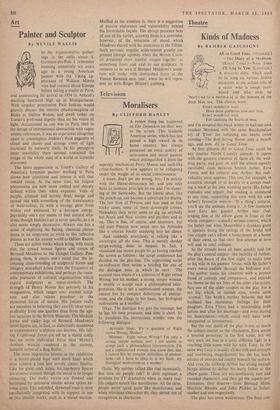Television
Moralisers
By CLIFFORD HANLEY I mean, don't get me wrong, boy, I'm strictly with the liberal-democracy bit, and you only have to mention principle to me and I'm slaver- ing at the barricades. But the liberal ideal, like the punch-up, can become a substitute for drama. The law firm of Preston and Son used to find tricky cases, some of them downright crimes. Nowadays they never seem to dig up, anybody but Nazis and Nazi victims and pacifists and so on. This is fine, of course, and necessary, but old man Preston now snaps into his Attitudes like a veteran hoofer snapping into his dance.
And suddenly everybody is talking like a sociologist all the time. This is merely shoddy script-writing, done in despair. In fact, I visualised one recent purple bit as having reached the screen as follows : the script conference has decided on the plot-line. The supervising script co-ordinator then writes a briefing for one of the dialogue boys in which he says: 'The accused man insists it's a question of Right versus Wrong, but his mother, a strong, simple woman, is unable to accept such a philosophical inter- pretation. She is not a sophisticated woman, she cannot live by complex definitions of abstrac- tions, and she clings to her basic, her biological motivations as a mother.'
Okay. The dialogue boy gets the message, but he has his own pressures, and time is short. So he translates his instructions nimbly into the following dialogue :
ACCUSED MAN: It's a question of Right versus Wrong, Mother!
MOTHER: Right versus Wrong? I'm only a strong, simple woman, son! I am unable to accept such a philosophical interpretation, I'm not a sophisticated woman, you know that, son. I cannot live by complex definitions of abstrac- tions—all I have to cling to is my basic, my biological motivations as a mother!
Quite. My mother talked Iike that incessantly. But how do people talk? It does represent a problem for TV dramatists when so many real- life codgers mouth like manifestoes. All the same, people never speak quite like manifestoes; and when television characters do, they shrink out of recognition as characters.


































 Previous page
Previous page